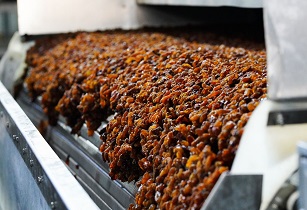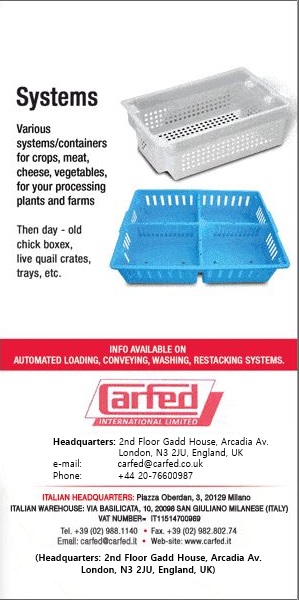TOMRA Foods global category director for Nuts and Dried Fruits, Brendan ODonnell explains how protecting and enhancing their competitiveness can help raisin processors profit from massive global demand
The demand for raisins is the increasing wealth of developing nations, with more and more people around the world becoming choosier about the foods they buy. According to market researchers, global sales are currently worth about US$2,400mn per year, and are expected to keep rising at a compound annual growth rate of about 4.5%. By 2030, worldwide sales will be worth US$3,600mn, and looking further ahead, dried fruit and nuts will be important in helping to feed the world's fast-growing population.
To keep pace with demand, processors are expected to deliver consistent product quality. This means that any foreign material must be removed and defective products must be detected and ejected from the line. At the same time as rejecting sub-standard fruit however, it is essential to minimise food waste. This is not only good for profitability but also demonstrates the commitment to sustainability that retailers nowadays expect to see from their suppliers. These needs have uncovered a widespread weakness in the dried fruit industry, which includes a dependence on aged line equipment that is simply incapable of competing on quantity or quality with today's sophisticated sorting and grading solutions. Therefore, by trading old line equipment for new, processors can take a big leap forward in capabilities and competitiveness.
The best solution for removing foreign materials is the TOMRA 5C, a premium optical sorter originally developed for the fruit and nut industry. This achieves unrivaled sorting accuracy by combining industry-leading sensors and a high-resolution laser with TOMRA's unique Biometric Signature Identification (BSI+) technology. Every object passing down the processing line is assessed for color, shape, and biological characteristics. By looking inside materials, BSI+ can detect smaller defects than conventional spectral technology, including embedded stems and mold. The TOMRA 5C's sorting efficiency is also enhanced by TOMRA's specialised raisin shaker, which ensures optimum product feed to the sorter. The second and third sorts are best handled by the TOMRA 5C and the TOMRA 5X. The latter is equipped with an advanced X-ray sensor, creating images of exceptionally high contrast and resolution. This is ideal for detecting high-density materials such as glass, dense plastics, and stones, including stones embedded in raisins.
A notable example of how raisin processors can benefit from the best sorting solutions is Osman Akça A.S., one of the biggest raisin exporters in Türkiye, the world-leading nation for raisin exports. “TOMRA's optical sorters help us meet the needs of export customers who have the highest expectations," said Osman Akça board member, Osman Göksan. "By positioning the TOMRA 5C at the end of the production line, we can improve our product quality by capturing the details that other laser systems overlook. We also like the fact that the TOMRA 5C is future-proofed to be compatible with possible future innovations in optical technologies and software."
For more information, visit: www.tomra.com









